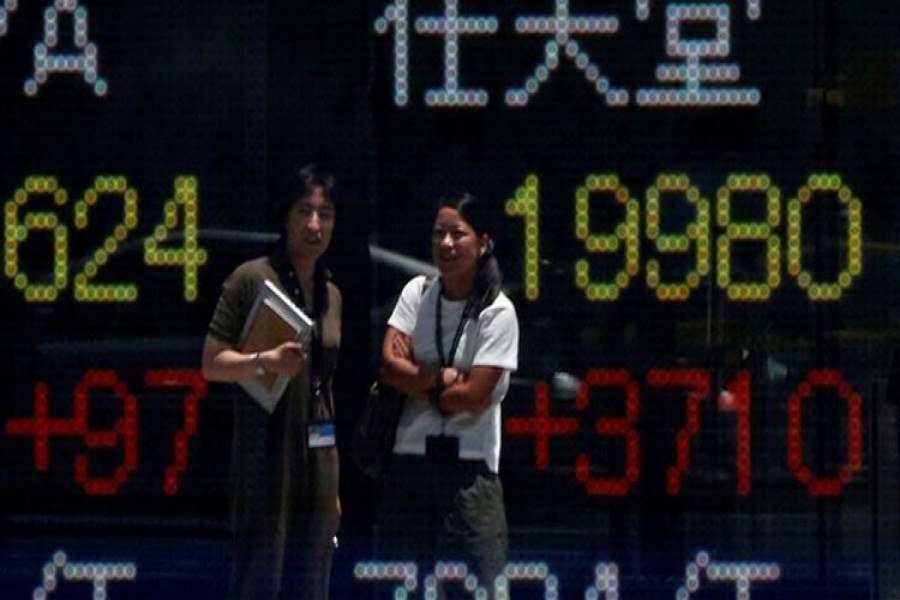
Published :
Updated :

Asian shares rose to their highest levels in nearly a decade on Thursday, bolstered by a surge in global markets, while the yen eased after the Bank of Japan reinforced expectations that it will keep massive stimulus in place far longer than other major central banks.
European markets were also set for a positive start, with financial spreadbetter CMC Markets expecting Britain's FTSE 100 and France's CAC 40 to open up 0.1 per cent and Germany's DAX to start the day 0.2 per cent higher.
MSCI's broadest index of Asia-Pacific shares outside Japan added 0.1 per cent, hovering near its highest level since December 2007.
Australian stocks rose 0.5 per cent and South Korea's KOSPI was up 0.3 per cent.
Chinese blue chips advanced 0.1 per cent, while the Shanghai Composite edged up 0.2 per cent. Hong Kong's Hang Seng crept up 0.2 per cent.
The MSCI World index inched up in its 10th straight session of gains and set a record high for the sixth consecutive day, lifted by all-time closing highs on Wall Street in the wake of strong earnings reports.
"Fresh all-time highs had once again been printed on various US indices including the S&P 500 and the NASDAQ, inspired by earnings," Jingyi Pan, market strategist at IG in Singapore, wrote in a note.
"Gains in the US and the higher crude prices are (helping) energize regional markets while earning reports in the Asian region will also be watched."
In currency markets, the yen weakened after the BOJ once again pushed back its projected timing for hitting its 2 per cent inflation target, as it cut price forecasts until fiscal year 2020.
The yen slipped 0.2 per cent to trade at 112.135 yen to the dollar following the BOJ decision. The weaker yen helped the Nikkei extend gains to 0.6 per cent.
The euro was steady at $1.1511 on Thursday, ahead of a meeting of the European Central Bank later in the session.
The common currency hit 14-month high this week following seemingly hawkish comments by ECB President Mario Draghi.
At Thursday's meeting, the ECB may drop a reference to its readiness to increase the size or duration of its asset-purchase program before announcing in the autumn how and when it will start winding down its bond buying.
"The euro has surged enormously on the back of hopes that the ECB is going to start the process of shutting the door on loose monetary policy," Naeem Aslam, chief market analyst at ThinkMarkets UK, wrote in a note.
"The ECB needs to be clear about its forward guidance and it should reinforce that in a subtle manner. Coming out of the gates too aggressively would create shock waves in the market."
The dollar index, which tracks the greenback against a basket of trade-weighted peers, rose 0.1 per cent to 94.894.
The Australian dollar set a new two-year high on Thursday, still heady from the minutes of the last Reserve Bank of Australia meeting, released Tuesday, which showed the central bank had turned more upbeat on the economic outlook.
It pulled back from that high to trade down 0.2 per cent from Wednesday's close at $0.7939.
The Canadian dollar was 0.1 per cent weaker at C$1.262 to the dollar. On Tuesday, it touched a 14-month high on record domestic factory sales and stronger oil prices.
Oil prices dipped after hitting a two-week peak on Wednesday on a bigger-than-expected weekly draw in crude and gasoline inventories in the United States.
US crude eased less than 0.1 per cent to $47.10 a barrel, after jumping 1.6 per cent overnight.
Global benchmark Brent also lost nearly 0.1 per cent to $49.67, holding on to most of Wednesday's 1.8 per cent gain.
Gold slid as the dollar pulled higher, falling 0.15 per cent to $1,238.10 an ounce on Thursday.


 For all latest news, follow The Financial Express Google News channel.
For all latest news, follow The Financial Express Google News channel.